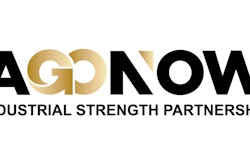BROUGHT
TO YOU BY:
WHERE DISTRIBUTORS
CAN FIND RESOURCES & HELP
WITH e-COMMERCE IMPLEMENTATION
TO START SELLING ONLINE
WITHOUT BREAKING THE BANK
WHY e-COMMERCE
ISN’T AS DAUNTING
AS YOU THINK
2 WHY e-COMMERCE ISN’T AS DAUNTING AS YOU THINK
EXECUTIVE BUY-IN
Like with any new company project,
e-commerce has to start at the top, as full
executive support is key to its success.
Without it, hiccups in funding and the overall
implementation process are more likely.
“You need to have that executive
sponsorship. If they’re interested in
long-term ROI and long-term customer
behavior, then e-commerce is right for
them,” says Caroline Ernst, Vice President
of eCommerce at AD, a well-known
association in the B2B distribution market.
“When we talk to our members, we try to
understand if e-commerce is a priority.
If it is, it’s likely to be successful.”
Industrial Distribution’s 2017 survey
asked its readership — primarily comprised
of small and mid-sized distributors — if
e-commerce is a priority for them (figure
2). Sixty-three percent of respondents said
yes — up more than three percentage
points from a year earlier. That’s a good
sign for e-commerce usage for the market,
but again, shows plenty of room to grow.
KNOW WHAT YOU WANT
The worst-case scenario in e-commerce
is investing major capitol in buying a
platform that doesn’t match your customer
wants or needs — or those of your own
business — and it ends up failing. This
In Industrial Distribution’s 2017 Survey of Distributor
Operations, 57 percent of respondents said they currently
generate web-based revenues (figure 1) — up 1.2
percentage points from the publication’s 2016 survey.
While that figure has steadily increased over the years,
that 57 percent figure shows there is still a considerable
amount of distributors yet to get involved with selling
online.
Some distributors say they don’t offer e-commerce
because their customers aren’t asking for it yet. Others
— especially small and mid-sized distributors — say it’s
simply too big and expensive of a project to take on, or
that implementation is just too complicated. It isn’t a small
project, but with the right corporate mindset, willingness
to find help, e-commerce is certainly manageable for
distributors of all sizes.
But some distributors
are still hesitant
to start selling online.
By now, it seems everyone
in B2B organizations has
accepted that e-commerce
will only continue to grow
as the preferred buying
method by their customers.
Are industrial distributors currently
generating online sales?
FIGURE 1
WEB-BASED REVENUES
65.03%
YES
34.97%
NO
3 WHY e-COMMERCE ISN’T AS DAUNTING AS YOU THINK
ties back to executive sponsorship, as
the company needs to identify what its
business needs are and what features will
meet or exceed customer expectations.
What e-commerce features do your
customers want? Maybe they don’t
need many, compared to other markets
or larger competitors. Are you going to
provide product content in-house? Are you
comfortable with a platform that doesn’t
require a lot of customization? The answers
to these questions will help determine the
cost of a platform, as those with advanced
features and a high level of customization
will be more expensive. Some distribution
businesses don’t require all of that, some do.
“It goes back to what your business needs
are,” Ernst says. “You start with good, clear
objectives, and then evaluate strategic
providers. There are lots of opportunities
if you have very clear objectives.”
GETTING HELP
Distribution executives experienced in
e-commerce are often asked for advice
in e-commerce implementation by peer
companies and even competitors, and one
of the first things they advise is to get help.
E-commerce can certainly seem daunting
when approached as a solo effort. There’s
no need for it to be that way. Getting advice
from fellow distributors and third-party
implementation service can go a long
way to avoiding pitfalls and headaches.
There is also a bounty of e-commerce
best practice articles, blogs and product
reviews that curious distributors
should make use of. These resources
often discuss who the top and most
reputable e-commerce providers are.
“Make use of the best-practice sharing and
leverage your own professional network,”
advises Ernst. “For those who don’t have
a strong network, there’s third-party
research. See who they mention as top
providers. Looking at third-party research
gives you that good seal of approval.”
Keeping an eye on successful competitors
that have e-commerce is another good idea.
Sure, you may not feel like adopting what
your rivals are doing verbatim, but taking
stock of their e-commerce features and
content can give newcomers ideas of what
to prioritize when shopping for a platform.
“The best thing is go look at your
competitors’ websites,” says Scott Assyia,
vice president/general manager of industrial
distributor Hanna Rubber Company. “We’ve
done that. Go to Amazon and see what
they’re doing. See how they’re positioning it.”
Implementation itself is can be a turn-off
for some distributors about e-commerce,
especially those companies that lack tech-
savvy staff or other in-house faculties to
integrate a platform with their existing
enterprise resource planning (ERP) system.
This is where imploring the service of
an e-commerce provider has the most
benefit. Third party providers specialize
in integrating an e-commerce platform
with distributors’ business process and
ERP system, eliminating the need for
duplicate data entry and management
of multiple product databases — leading
to less overall operational costs.
— Scott Assyia,
Vice President/General Manager
Hanna Rubber Company
“ e-Commerce is a small percent of
our sales, but it’s an area everyone
wants and needs to have a hand in.
That’s going to grow.”
e-COMMERCE
Is this a priority for industrial distributors?
59.8%
YES
40.2%
NO
FIGURE 2
4 WHY e-COMMERCE ISN’T AS DAUNTING AS YOU THINK
Business software provider Epicor
recently launched a solution — Epicor
Commerce Connect (ECC) — aimed to
help distributors’ digital transition. Used in
tandem with the popular Epicor Prophet
21 ERP system, cloud-based ECC is tightly
integrated with the rest of a distributors’
business process, and in real-time. On the
customer side, the end result is a modern
e-commerce website focused on buying
convenience and easy reordering.
Whereas some third-party platforms
come as an all-or-nothing solution — often
bigger than a small or midsize distributor is
ready for, ECC is based on an open source
platform that gives users future flexibility to
add new capabilities and features as they
grow without being locked into one vendor’s
ecosystem. Meanwhile, its turnkey features
allow for rapid implementation so distributors
can get their solution up and running fast.
Epicor Software Corporation (epicor.com) provides industry-specific business
software designed around the needs of manufacturing, distribution, retail
and services organizations. Epicor’s more than 40 years of experience with
its customers’ unique business processes and operational requirements
is built into every solution — in the cloud, hosted or on premises.
The information in this report was
researched and produced by Industrial
Distribution in conjunction with Epicor.
Statistical data was researched and
compiled by Advantage Business
Media in April 2017.
ABOUT
THIS REPORT
ABOUT EPICOR
— Caroline Ernst
Vice President
AD eCommerce Solutions
“ We think about it like your digital branch.
If you’re opening a digital branch, e-commerce needs
operations, financial support and partnerships.”
There’s no doubt that more and more distributors will continue to add
e-commerce as a business channel. Those that don’t risk weakening their
competitiveness and falling behind customers’ changing buying habits. And
while e-commerce isn’t a small project, there is plenty of help, resources and
integration assistant available to ensure success.
But it all depends on one question —
is e-commerce a priority for you?
Selling Online Without Breaking the Bank
Some distributors say they don’t offer e-commerce because their customers aren’t asking for it yet. Others — especially small and mid-sized distributors — say it’s simply too big and expensive of a project to take on, or that implementation is just too complicated. It isn’t a small project, but with the right corporate mindset, willingness to find help, e-commerce is certainly manageable for distributors of all sizes.
Latest in Home
Cutting Tool Maker Opens New North American Headquarters
September 12, 2025
Metalworking Machinery Orders Up More than 20% in July
September 11, 2025
Milwaukee Tool Announces $42M Expansion in Wisconsin
September 11, 2025






















